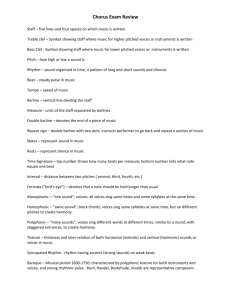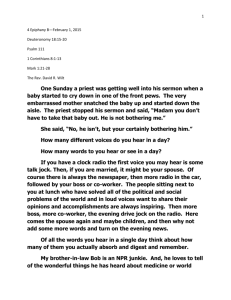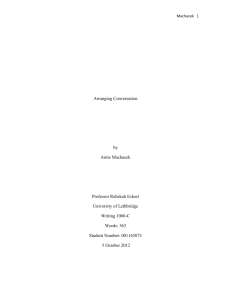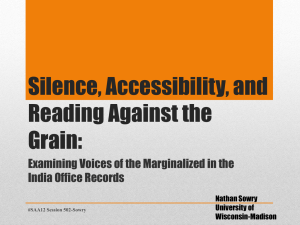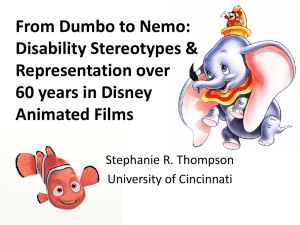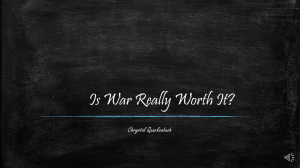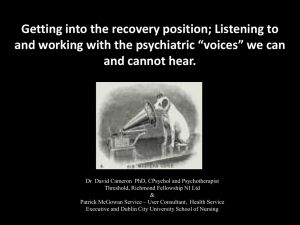Ecstatic Voices and Ethical Responsibility
advertisement
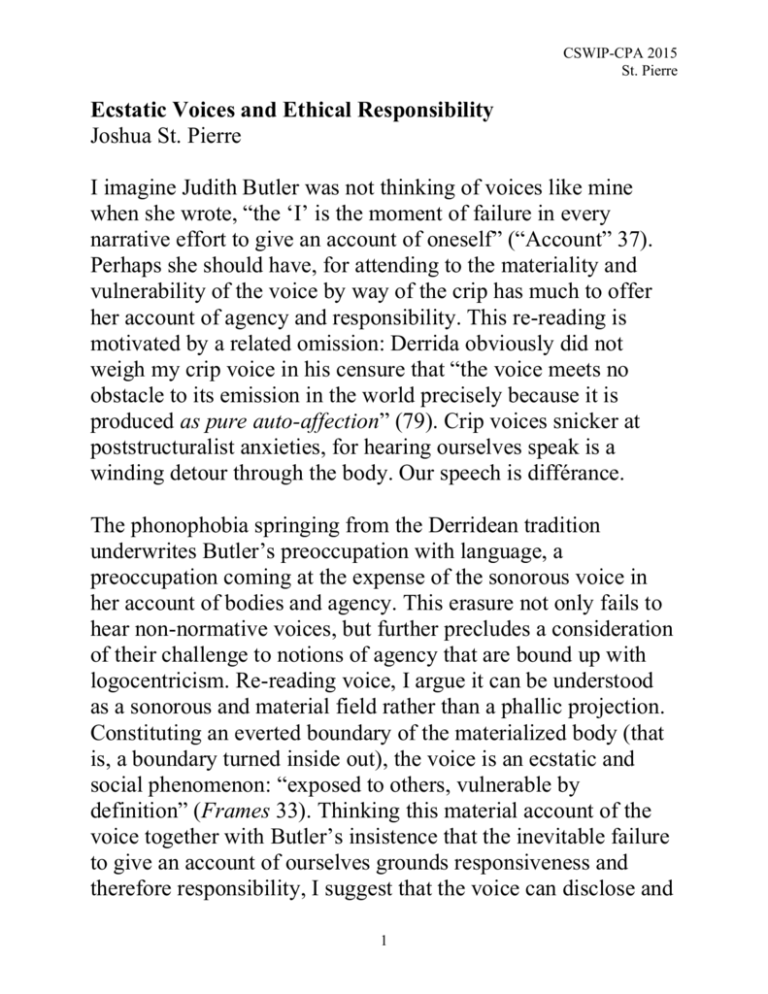
CSWIP-CPA 2015 St. Pierre Ecstatic Voices and Ethical Responsibility Joshua St. Pierre I imagine Judith Butler was not thinking of voices like mine when she wrote, “the ‘I’ is the moment of failure in every narrative effort to give an account of oneself” (“Account” 37). Perhaps she should have, for attending to the materiality and vulnerability of the voice by way of the crip has much to offer her account of agency and responsibility. This re-reading is motivated by a related omission: Derrida obviously did not weigh my crip voice in his censure that “the voice meets no obstacle to its emission in the world precisely because it is produced as pure auto-affection” (79). Crip voices snicker at poststructuralist anxieties, for hearing ourselves speak is a winding detour through the body. Our speech is différance. The phonophobia springing from the Derridean tradition underwrites Butler’s preoccupation with language, a preoccupation coming at the expense of the sonorous voice in her account of bodies and agency. This erasure not only fails to hear non-normative voices, but further precludes a consideration of their challenge to notions of agency that are bound up with logocentricism. Re-reading voice, I argue it can be understood as a sonorous and material field rather than a phallic projection. Constituting an everted boundary of the materialized body (that is, a boundary turned inside out), the voice is an ecstatic and social phenomenon: “exposed to others, vulnerable by definition” (Frames 33). Thinking this material account of the voice together with Butler’s insistence that the inevitable failure to give an account of ourselves grounds responsiveness and therefore responsibility, I suggest that the voice can disclose and 1 CSWIP-CPA 2015 St. Pierre ground our ethical connection with others. This framing centres non-normative voices in a discourse that has long excluded them. Equating the voice with agency has a long humanist and metaphysical lineage. The ubiquitous locution “being heard” invokes the democratic ideal of vox populi—the voice of the people. Here, agency is grounded in a self-identical relation of voice and identity. To speak and be heard in the midst of Others, put otherwise, is to be recognized and counted as a subject through the authentic self-presence of the voice. Equating voice with self-identity with agency has the problematic effect of excluding voices regarded as opaque. For example, Chris Eagle notes that “from this vantage point it is easy to see how fluent speech itself becomes politicized, as a measure of one’s political agency.” While these forms of exclusion persist and take on many forms, as noted above, the Derridean response to the problematic relation between agency and speech taken up by Butler and others has not been to interrogate critically the phonetic register, but to eschew the voice altogether. What is accordingly needed is to pry some space between speech and voice such that the voice can resonate on its own accord. The conflation of speech with voice is emblematic of the metaphysical tradition as a whole, since as Adrianna Cavarero writes, “when the register of speech is totalized—for instance, when it is identified with a language system of which the voice would be a mere function—it is indeed inevitable that the vocal emission not headed for speech is nothing but a remainder” (122 CSWIP-CPA 2015 St. Pierre 13). Following Cavarero, if we consider that “the sphere of the voice is constitutively broader than that of speech: it exceeds it” (13), agency can be refigured around vulnerability and our opaque relation to ourselves. Starting from Cavarero’s insistence that the sphere of the voice exceeds speech and signification, the voice gains a stubbornness that can’t undermined quite so easily. Diverging even from those like Mladlen Dolar who regard the voice as corporeal, yet ephemeral, Musicologist Michelle Duncan argues that “voice does not simply appear on stage and then disappear. Voice puts matter into circulation, matter that is more or other than language, more or other than even performative utterance” (303). Attending to Duncan’s understanding of the voice, I accordingly suggest, pace Dolar, yet with Don Ihde, that the voice is topographically more akin to a field than a missile. The matter put into motion is not a phallic projection, and does not quietly dissipate with the phoneme. Rather, “the voice that emanates from this body is one that carries remnants of the body with it, remnants that gain, through propulsion, a weight of their own” (Duncan 303). The voice is ecstatic—standing outside ourselves—such that it everts and redefines the contours of the body. That is, coming from “within,” yet perforating the boundaries of bodies, the voice can be understood as an opening onto the world, a bodily site of contact with others. This conception of the voice resonates with Margrit Shildrick’s suggestion that “To a greater or lesser extent, none of us is entitled to claim a singular body” and that “our bodies do not end at the skin” (2015). The voice as bodily is necessarily public, characterized by unwilled proximity difficult to shut out that leaves us exposed and vulnerable to others. Crip voices 3 CSWIP-CPA 2015 St. Pierre accentuate this aural spectacle, highlighting the “stickiness” of the voice that weaves bodies together. [Shifting to ethics] Turning the tables on the humanist logic that equates coherency with personal and social responsibility, Butler argues in “Giving an Account of Ourselves” that it is precisely because the subject is not transparent to itself that we are responsible to others. Any attempt to narrate our lives, and thus produce a coherent “I” must be recognizable and intelligible. This requisite disruption of the unity of my narrative means that I am never identical to myself—divided and incoherent—and that I am from the start always given over to, implicated with, and constituted by the Other. Put in terms of ecstatic constitution, “to the extent that [the ‘I’] agrees, from the start, to narrate itself through [recognizable] norms, it agrees to circuit its narration through an externality, and so to disorient itself in the telling” (32). The humanist link immediately deriving agency from self-presence is ruined by the impossible demand of self-identity and complete coherence. I am always, already opaque to myself. If the “I” is the moment of failure in every effort to give an account of oneself, the ecstatic movement constituting me through and in others, and the impossibility of telling myself straight, a robust kinship emerges with the voice—especially cripped voices. Understood within the humanist logic that collapses voice, self-identity, and agency into each other, crip voices lose the foothold of immediate presence granting them agency. Yet from our perspective these tables are easily turned. The opaqueness of the self entails that “we are not precisely bounded, not precisely separate” (39), but co-implicated with 4 CSWIP-CPA 2015 St. Pierre others in a matrix of reciprocal vulnerability and responsibility. If we consider that it is precisely our co-implication—our leakage—with others that grounds responsibility, then the voice in its materiality, its stuttered movement through the world that gets snagged on bodies and objects, can be reimagined as a site not just of political contestation of who gets heard (though this is also important) but as an ethical sphere of belonging and becoming responsible to each other. 5
